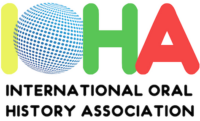by Nancy MacKay
This October I joined 482 lovers of oral history in Minneapolis, Minnesota for the 51st annual conference of the Oral History Association, themed “Engaging Audiences: Oral History and the Public.” We welcomed incoming co-directors Dr. Louis Kyriakoudes and Dr. Kristine McCusker, both from Middle Tennessee State University, the new institutional home for OHA. We expressed thanks to out-going Interim Executive Director Kristine Navarro-McElhaney for her leadership through the past two difficult years. We also greeted incoming president Todd Moye and cheered the accomplishments of outgoing president Doug Boyd.
As usual, the conference attracted a diverse group of scholars, archivists, students, artists, and activists from around the country and the world. International attendees came from China, Canada, Scotland, Finland, England, and Australia. Marella Hoffman, a first-time attendee traveling from the England sums the enthusiasm of international attendees: “I was amazed to find the conference and the Minneapolis area so uplifting. Intellectually, the oral history applications were diverse and probing. But shared values – equality, a learning attitude, social justice – lit up all the topics and personalities. As I’ve never been so inspired by a conference, I can’t wait to regroup next year in Montreal. “
Minnesota is situated on the ancestral lands of the Dakota and Ojibwe people and Minneapolis is home to more than half of the state’s Native American population. The American Indian Cultural Corridor, near the conference hotel, is the site of the founding of the American Indian Movement (AIM) in the late 1960s. Minneapolis historian Kim Heikkila’s walking tour highlighted some of the milestones of AIM history — the first American Indian Center in the United States, the first urban American Indian health clinic, and the first American Indian preference housing project. Heikkila’s presentation on the Eat Street Oral History Project, documenting the cultural corridor, provided deeper insights into the dynamics of living in this diverse part of the city.
The OHA International Committee met on October 4, 2017. The monthly blog featured on the OHA website will be discontinued. The Committee will take an active role in providing information for those who will be traveling to Montreal (passport, visa requirements etc.) and have this posted to the OHA website. A first time International Committee reception was held after the meeting with at least 100 people in attendance. It was wonderful to meet and speak to so many attendees.
The Mentoring Program, now in its third year, is a popular new program where first-timers to OHA can develop one-on-one relationships with more seasoned members. Mentors and mentees are pre-matched by OHA and can exchange emails before meeting in person at the conference. I spent some good times with my mentee, Bruce Johansen, and found his museum work amazing. Bruce’s comments attest to his own interest: “The presentations weren’t overly steeped in abstract theory, but instead focused more on nuts and bolts of doing the work, providing ideas that had practical application. I was especially struck by the creative ways that museum professionals are weaving oral history into exhibitions. … All in all, attending the annual meeting in Minneapolis was a terrific first experience for me.”
One of the new features of this conference was a free workshop on OHMS (Oral History Metadata Synthesizer), the indexing and metadata tool developed at the Nunn Center for Oral History at the University of Kentucky. OHMS is a popular alternative to transcription and is used by institutions around the world. The tool is free to all and open source, ready to be adapted to oral history projects of various sizes and shapes.
These are just a few of the many highlights. Stay tuned for more information on OHA 2018, October 10-13 in Montreal, Quebec with the theme “Oral History in Our Challenging Times.” See Call for Papers here.

